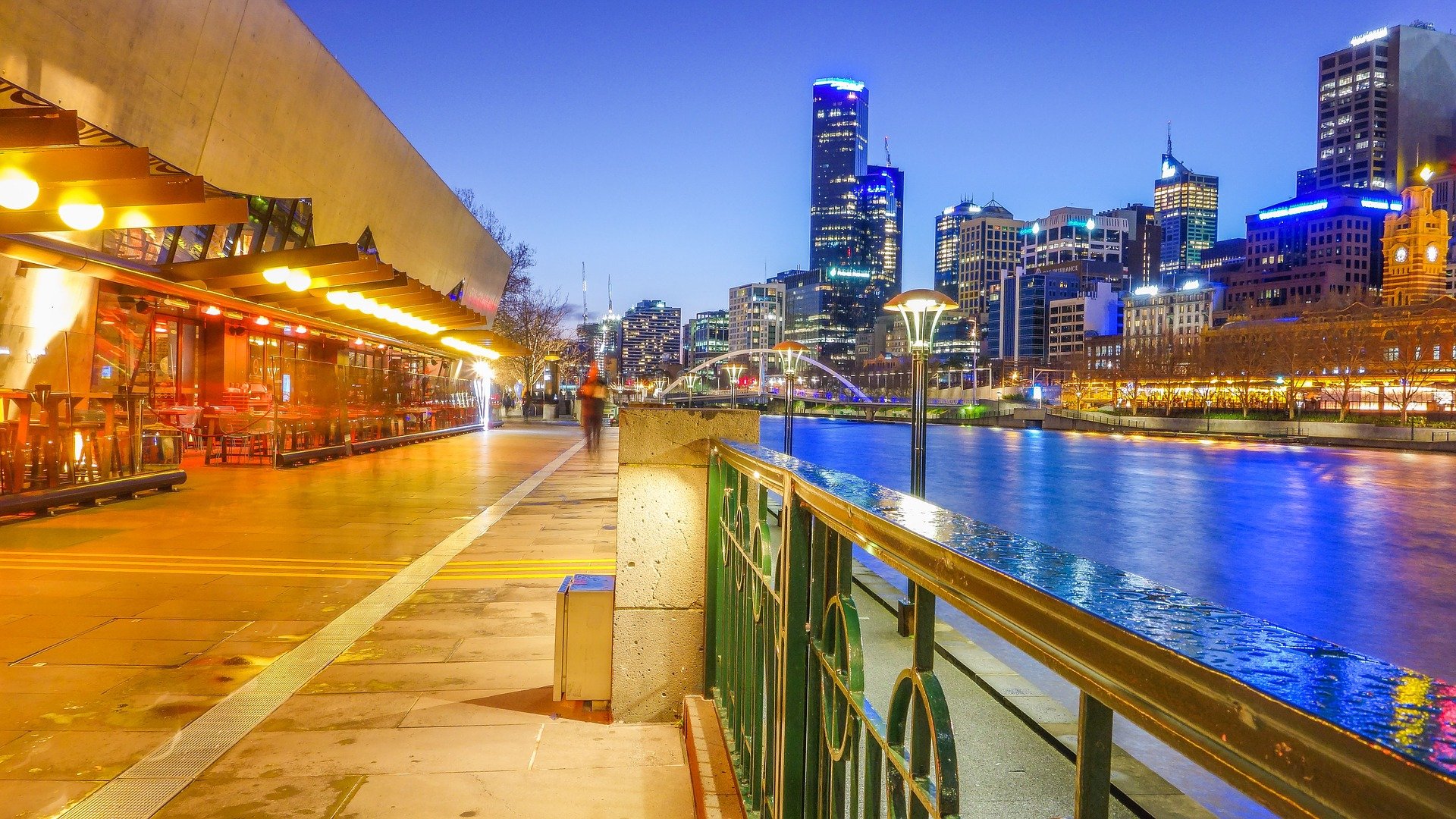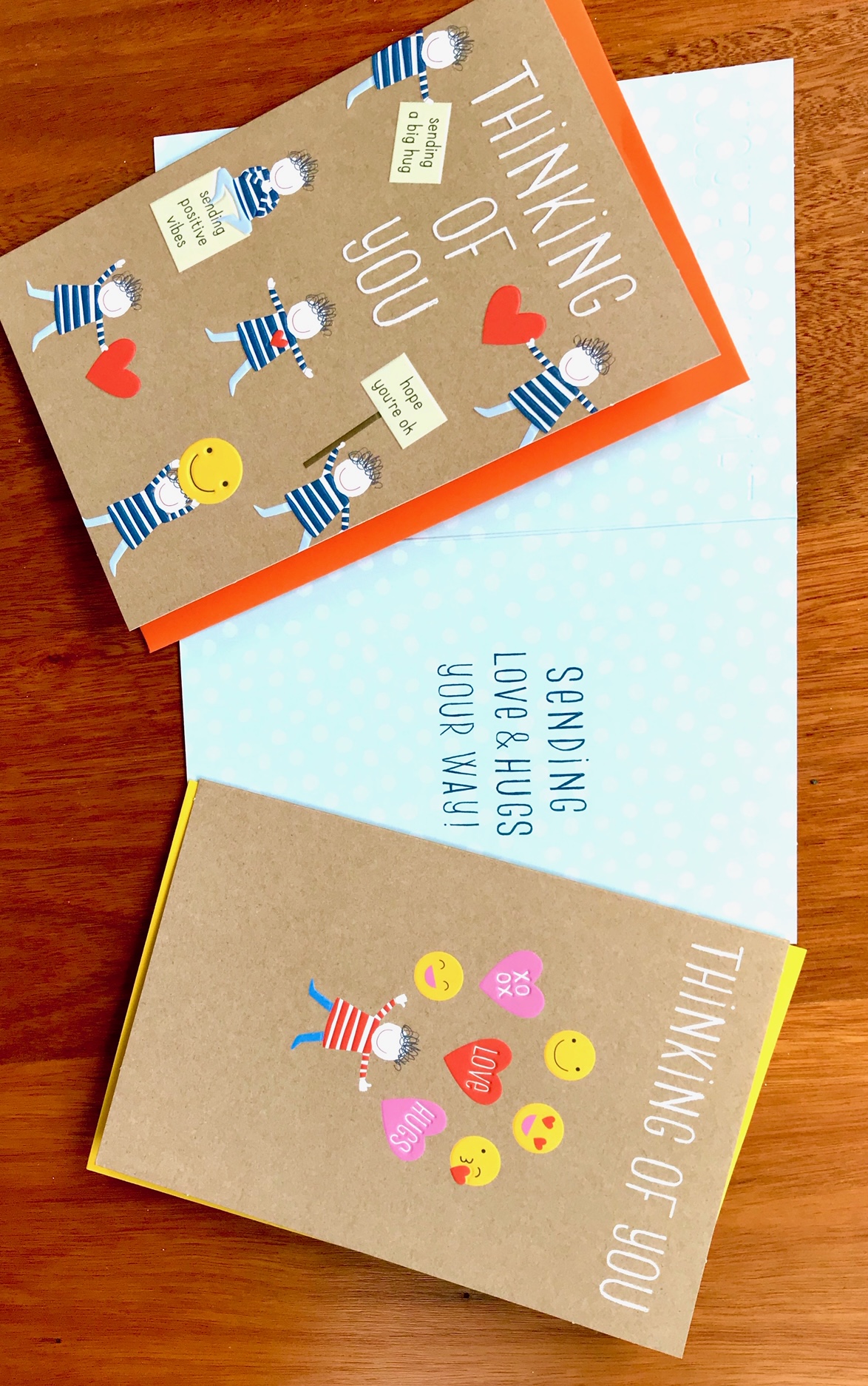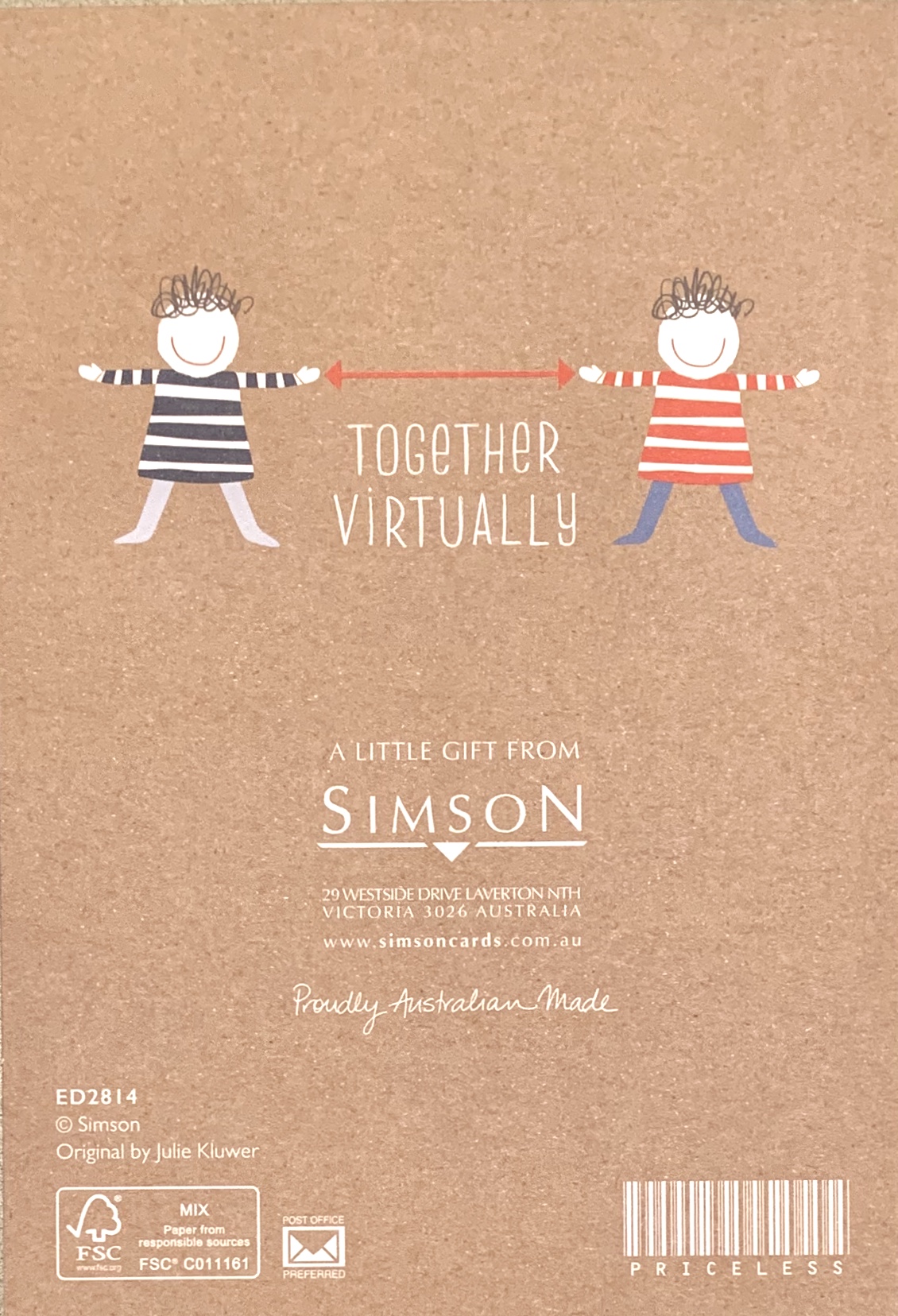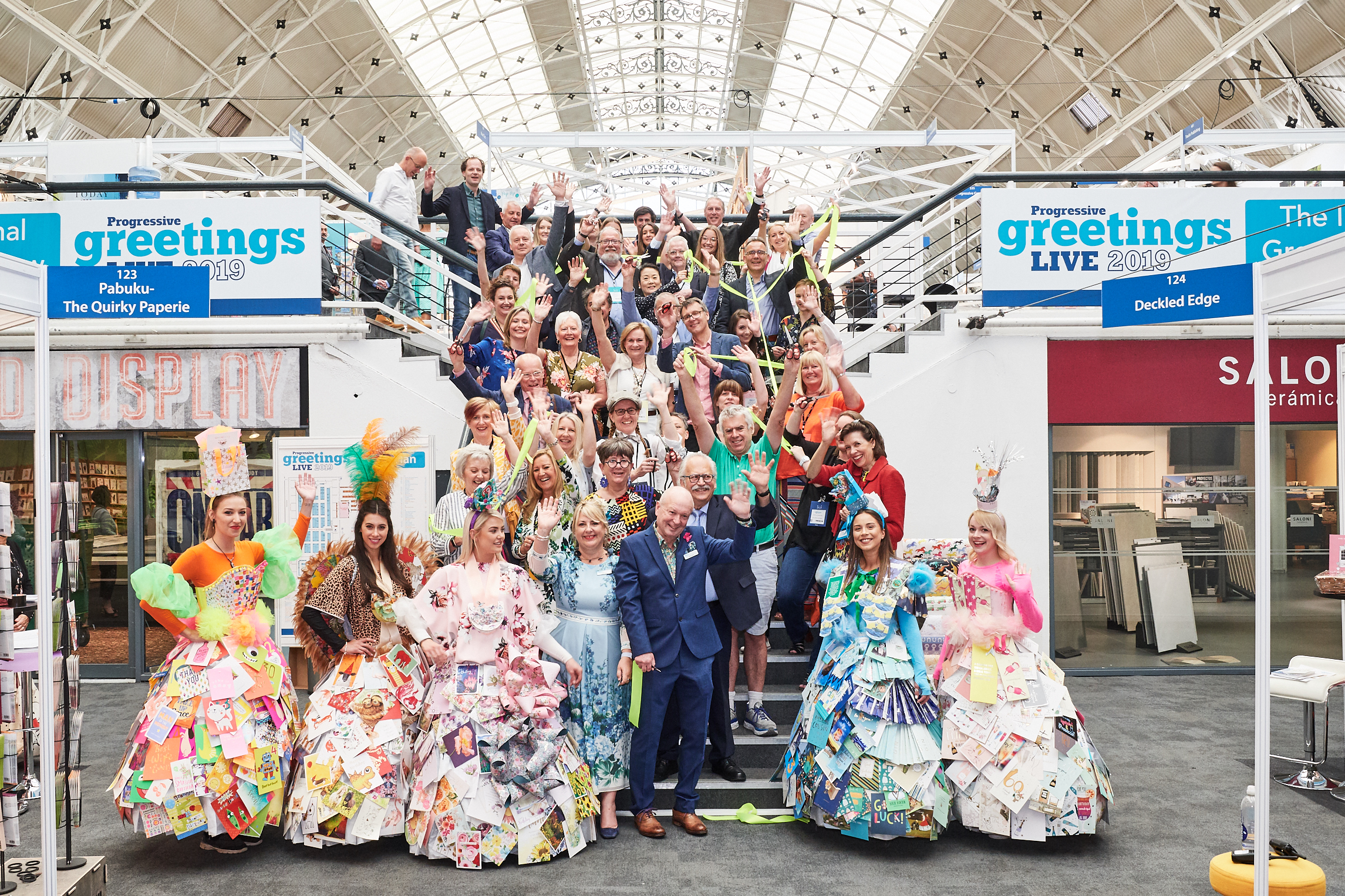Husband and wife duo, John and Bindi Simson, co-own Simson Cards, a leading Australian publisher and distributor for many UK greeting card publishers. While naturally upbeat people, the strict lockdown restrictions in the south eastern state of Victoria in Australian, which includes Melbourne, where Simson Cards is based is posing some challenges, but the role of cards is winning through. Here, Simo shares his take on the situation…
“As I write this, some suburbs in metropolitan Melbourne where there were early 2nd wave ‘hotspots’ are navigating their lives through their 12th week of Stage 4 lockdown restrictions. For other suburbs in Melbourne, we are currently into our eighth week with another week to go before the State Government will decide if the ‘currently’ lower infection rates will allow us to open up our city and economy.
Stage 4 restrictions in Melbourne mean that you cannot leave home unless for work that is deemed essential. All non-essential retail – including restaurants, cafes, pubs and non-food retailers – are shut, and have been for eight weeks. There is a curfew from 9pm–5am (which at my 64 years of age has zero impact!) and you are only allowed outside your home to exercise for two hours per day.

Metropolitan Melbourne is also the home to the publishers and or distributors of about 98% of all greeting cards sold in Australia.
Looking back six months to March when COVID first hit Australia, sales within the greeting card sector crashed in the second half of that month. In the capital city’s central business districts, April was a total disaster (and still is), but with everyone working from home in the suburbs, greeting card sales began to recover.
Under our Federal Government’s retail lockdown requirements, only essential businesses were allowed to remain open. Fortunately for the greeting card publishers and distributors, newsagents were considered to be essential because they sold newspapers and helped keep the community informed. Newsagents in Australia are a little different to those in the UK and are more like a WHSmith.
The mood in the community was raw and the feeling of isolation was setting in.
So, we decided we wanted to spread some love across the country by giving our customers some Thinking of You cards, at no cost, for them to give free to their customers irrespective of whether that customer bought cards, newspapers, magazines or just an ice cream.

This was to be no gift with purchase policy. So, for every order we sent out, a customer was given 50 cards to give away. Some customers who ordered often, received three or four sets of 50 cards to give away. In total we sent out over 18,000 cards.
The cards were ‘proper’ cards using 300 gsm FSC Fedrigoni board, complete with embossing and coloured envelopes. The characters on the rear depicted social distancing and the barcode reads ‘PRICELESS’.

The customer response to these cards was extraordinary. The retailers were so grateful and they gave their customers a reason to write a card to family or friends they were not able to visit. Another 1,000 cards were sent to all our staff and our business partners – from suppliers, accountants, bankers, solicitors and even our local fruit ‘n’ veg mart. It was a great success and showed that a little love in this mad world we are all currently in, goes a long way.
Back then, the queues for unemployment benefits exploded along suburban footpaths. So, the Federal Government introduced JobKeeper, a $1,500 (approx £825) subsidy per fortnight to employers to keep employees in work. If a person was earning less than $1,500 per fortnight, their salary was topped up to that amount, even if they were not able to work at all, due to say store closures. If they were earning more than $1,500 per fortnight, then they were paid for the work they did at their normal rate, but the Government subsidised the employer with $1,500. Most of our staff across April to the end of June worked on reduced days per week and all but our warehouse crew and sales team were and still are, working from home.
Unlike the furlough system in the UK, Australian employees on JobKeeper were allowed to keep working, whether that be from their homes or in the factories and or warehouses (if their job could not be undertaken from their home). Under JobKeeper many instore greeting card merchandisers we employ were earning three to four times their normal pre COVID fortnightly income, and while this Government subsidy had its faults, this programme was a ‘lifesaver’ for most greeting card businesses. It was for ours!
Across May and June sales began recovering by about 10% per week until mid-July when they were back to 90% of last year…then the second wave hit metropolitan Melbourne.
With most early infections coming from returned travellers, the Federal Government was quick to introduce 14-day mandatory hotel quarantine. In most capital cities, the local State Governments took up the Federal Government offer to use the military as well as their own police forces to guard returning travellers. But in Melbourne, the State Government insisted they use private contractors, who did not have the number of guards required and so outsourced the job to anyone who put up their hand and then provided those with little or no training. Some of these guards fraternised with guests in their hotel rooms, openly mixed with guests and ultimately became infected. These guards then went home to large multi-family functions that were at that time, illegal gatherings and the second wave was upon us.
Before the second wave, Australia had only recorded a little over 100 COVID-related deaths. Now some eight weeks later, that figure has grown to over 800, with almost all of those additional 700 coming from Melbourne with the genome tracing showing all originating from the hotel quarantine fiasco.
Compared to our friends in the UK, across Europe and over the pond in the States, our COVID-related death rate (even accounting for our lower population), is nowhere near the tragedies you have all endured over the past six months. All our hearts go out to you, your family and friends that have been so impacted by this pandemic as the UK and nearby countries transition into second waves.
With distances between our capital cities counted in the many hundreds of miles, if not in the thousands, state borders in Australia have been essentially closed to all interstate travellers. This has helped control the spread of the virus, but it has also caused significant issues. These border controls have not been without their controversy. We have a sales person who lives in south east Queensland, 20 miles from the New South Wales northern border. She cannot service her customers 21 miles away across the State border. Likewise, there are people living in north New South Wales, 20 miles from a hospital in Queensland, who have to travel 500 miles south to Sydney for emergency treatment. It is madness!
As to coming over to the UK to drink your warm beer, this is currently but a pipe dream. We so hope that by PG Live next June we will be able to hold hands with you all, but it is no certainty.

All Australians are currently banned from leaving the country.
The woes of a greeting card publisher during this pandemic pale to insignificant when compared the financial plight of so many other industries and the businesses within them across our wonderful country. While some business have had a ‘field day’ during the pandemic as people order online for home-related purchases using both money from JobKeeper and savings that might have previously been allocated to a holiday that can no longer be taken, other business have been destroyed by this pandemic, many of whom will not reopen. The greeting card industry, by being allowed to remain open and trade, will probably have a negative growth year, but we have had a pretty easy run compared to others.
Even if Melbournians are allowed next week to revert back to Stage 3, non-essential retail stores will remain closed until late October. That’s getting awfully close to peak Christmas trading when most businesses in the greeting card industry reap the majority of their annual profits that soften the usual post-Christmas losses. If the department stores and other retail multiples do not open fully by the time we hit November, there are going to be tears in the greeting card industry.
Outside of Melbourne, greeting card sales across Australia are becoming more encouraging, slowly building back to 2019 levels.
After a decade or more of social media announcing the imminent death of greeting cards, it would seem that COVID-19 has lit a match, igniting people to enjoy the pleasure of buying, writing and sending a greeting card to family and friends. It is providing a lifeline that social media cannot replicate.
The Australian economy is currently in an ‘official’ recession. Our Government’s reaction to the impacts of COVID-19 have perhaps saddled our children and grandchildren with unfathomable debt, but we remain positive that the there is life in a greeting card for the foreseeable future.”
Top: John and Bindi Simson in their offices in Fitzroy, a suburb of Melbourne.





















